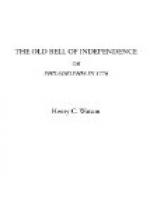“An appropriate ceremony,” said Wilson.
“It must have been a great sight,” observed Mrs. Harmar.
“They should have caught the man himself, and burnt him instead of a stuffed figure,” said Higgins.
“It would have saved Andre,” remarked Smith.
“The scoundrel!” exclaimed Morton. “He ought to have been put to death with all the torture the Indians use with their captives.”
These slight remarks indicated the peculiar manner in which each of these individuals viewed a subject.
“The British generals expected that Arnold’s example would be followed by numbers of the Americans; but I think they soon saw the character of the people, and the way they regarded Arnold,” said old Harmar.
“It’s my opinion that Arnold’s going over to the enemy was a benefit to our cause,” remarked Smith. “Such men are stains upon the character of the people with whom they associate; and if a selfish, sensual traitor was fit company for Sir Henry Clinton and his officers, he was not for Washington and the other generals of our army.” “Some of our people thought that he would prove a dangerous foe; but, after the attack on New London, all his activity and bravery seem to have fallen asleep. We had many men who could have met and defeated him, with anything like equal force. We did not lose much by his treachery, and the British lost Andre, who would have outweighed many Arnolds,” said Morton.
“But treason found its reward,” observed Mr. Jackson Harmar. “If Arnold had an atom of conscience or sensibility to shame, the curses of a whole people, whom he had turned from admiring friends to bitter foes, and the jeers and scorn of those whom he wished to make friends, must have planted many a thorn in his bosom, to rankle and poison his life.”
“If he had any conscience?” remarked Morton, with an unbelieving smile.
“The people of Philadelphia showed that they had the true patriotic spirit in them, in burning that effigy of Arnold,” said Mr. Jackson Harmar; “and taught the enemy that, though they might buy one man, they could not hire a people to follow wrong example.”
CAPTURE OF GENERAL PRESCOTT.
“Well, leaving Arnold to the execration of all patriotic and pure-souled men,” remarked Mr. Jackson Harmar, assuming the post of pilot to the conversation, “there is an exploit of the Revolution which always struck me as being one of the most daring and perilous to be found in the annals of war. I mean the capture of Major-General Prescott by Major Barton. If either of you, gentlemen, know the circumstances of that affair, I would be obliged to you for your information.”




